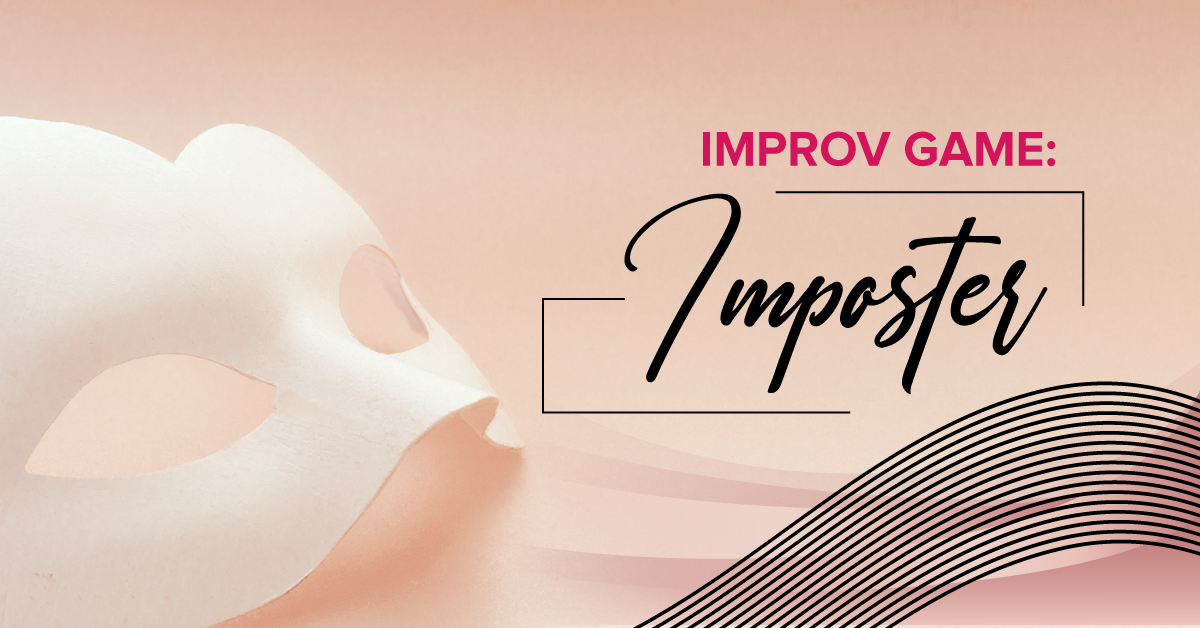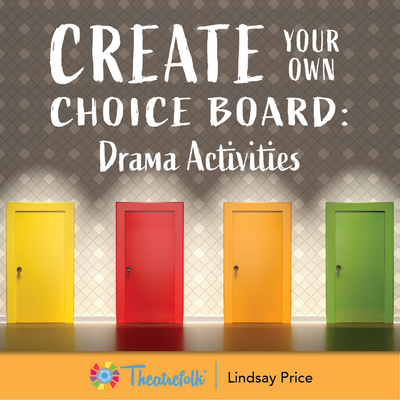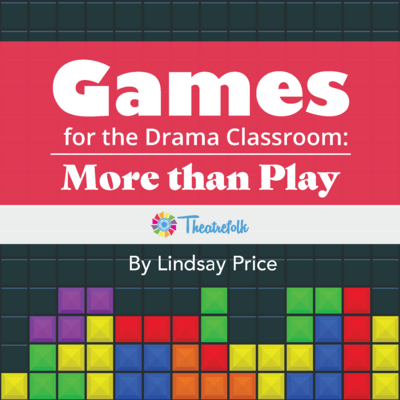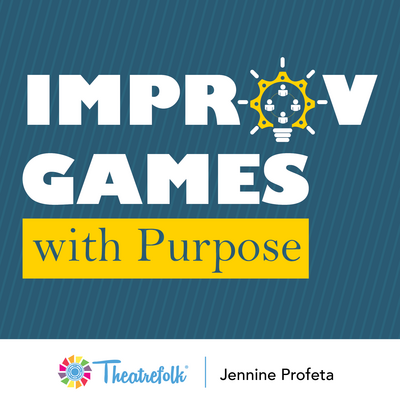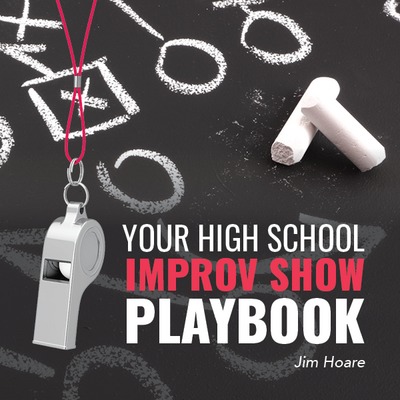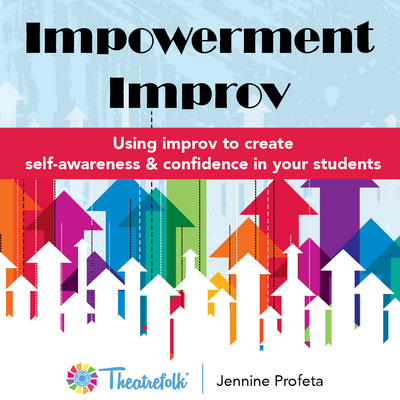
Using Improv to Address Fear of Failure
Fear of failure is a huge concern in drama class. Nobody wants to fail – it’s not a good feeling, and students are hyper-aware of not only their own feelings, but their perceptions of what others in the class think of them. Making a mistake can be paralyzing because students are afraid of looking foolish, unintelligent, or unaware in front of others – so they often won’t even try a task without a huge amount of anxiety.
However, the following improvisation game, The Alphabet Improv Game, is great to try with your students because it’s a pretty challenging one. It is inevitable that your students are going to make mistakes and “fail” while playing it, because even the most seasoned improv performers find this one difficult. The point is to try the game, make mistakes, and see that making mistakes is not the huge deal that students can make it out to be. The goal is that your drama students will realize that everyone makes mistakes – it’s not just them, stuck in their own heads. And at the same time, they get to have a lot of fun!
Instruction
The Alphabet Improv Game is played as a full class.
- Have students sit in a circle.
- Select three to four students to start the scene.
- Have the rest of the group choose a location (e.g. supermarket, classroom, movie set, theatre rehearsal, corporate office, desert, jungle).
- The first group of students will start the scene. However, each sentence spoken by a new person must start with the next letter of the alphabet, from A to Z. (Each word in the sentence doesn’t have to start with that letter.)
- Students need to listen carefully and remember what letter they are currently on!
- For example, if the scene is taking place on a movie set:
1. Student 1: “Annnnnnd…action!”
2. Student 2: “But soft, what light through yonder window breaks?”
3. Student 1: “Cut, cut! Can you do that again, please? We can’t hear you!”
4. Student 3: “Don’t speak so quietly.”
5. Student 2: “Everyone else on this set can hear me…can’t you guys?” …and so on.
- If a student starts their sentence on the wrong letter or repeats a letter that was already used, then they have to sit down and the next student in the circle replaces them. The scene continues on, with the new student either taking on the same role or coming in as a different person. The location remains the same.
- If there is a long pause and none of the students can think of the next sentence, all of the current students have to sit down and the next three to four students in the circle replace them. They pick up from the last letter used. So if the last line was “Man, it’s so hot out here!” then the next sentence must start with N.
- The scene must be completed by the time the students get to the letter Z. Then the scene may start again with three to four new students in a new location until the full class has had the opportunity to play.
- If your students find this game too easy, have them go through the alphabet backwards, from Z to A!
If your students ask, there is no prize or reward for one person/group being able to complete the game in one try. This is not a competitive game and that’s not the point of it.
After each student has had a chance to participate, have a debrief conversation with the class. How do they think they did? What were the easiest and most challenging parts of the game? How did your students feel if they made a mistake? If you notice students are getting overly critical of themselves, acknowledge that there is always room for improvement but that everyone makes mistakes and it’s completely normal to do so. Then ask them to discuss positive moments that arose while playing the game. They will explore their thoughts further while completing an individual Reflection.
Distance Learning Adaptations
Alphabet Warm-Up (Full Class)
- The goal is for students to recite the alphabet out loud, from A to Z, one person at a time. One student says “A”, another student says “B”, another student says “C”, and so on, without following an assigned running order.
- If two students say the next letter at the same time, or a letter is skipped, the group starts over at A. Students cannot cue or coach each other, or give visible hints.
- Ask students: What is the purpose of this exercise? What are the benefits to students of doing this warm-up?
Alphabet Storytelling (Full Class)
- Determine a running order of students.
- Students will tell a story, one sentence at a time, starting with the letter A. The next student will start their sentence with the letter B, and so on, from A to Z. (Each word in the sentence doesn’t have to start with that letter. See the example in the article above.) Students must focus on starting with the correct sequential letter, as well as ensuring their sentence has a specific beginning and ending, and that it makes sense with the story topic.
- If a student starts their sentence on the wrong letter or repeats a letter that was already used, they are out. The story continues on until the students reach Z.
- Once students are able to tell a story with an assigned running order, try the exercise again without a running order. Students will need to listen that much more carefully to avoid interrupting each other.
Virtual Alphabet Improv Game (Full Class)
- This game can be played using a video conferencing program, pretty much exactly the same way as the in-person version. Assign 3-4 students to create an improv scene, and have the rest of the students ready to jump in if a letter is missed or a long pause occurs. If you wish, determine a running order for participating students in advance, so students know when they are “on deck.”
Related Articles
Create Your Own Choice Board: Drama Activities
by Lindsay Price
Choice boards give students the opportunity to choose how they want to learn a particular subject. Create Your Own Choice Boards: Drama Activities can help encourage your students' independence by allowing them to take an active role in their learning.
Distance Learning
by Christian Kiley
A play about trying to survive and thrive in a virtual classroom.
Games for the Drama Classroom: More Than Play
by Lindsay Price
A collection of games and activities that go well beyond the notion of "play."
Improv Games with Purpose
by Jennine Profeta
Improv games including feedback suggestions and questions, game variations, teaching tips, side coaching tips, entry prompts, exit slip questions, and more!
Your High School Improv Show Playbook
by Jim Hoare
Have you wondered how to take improv to the next level with your students? Your High School Improv Show Playbook is the "how-to" guide for you! Empower students to present their first improv show that is fun and entertaining for all.
Impowerment Improv
by Jennine Profeta
Using improv to create self-awareness & confidence in your students


